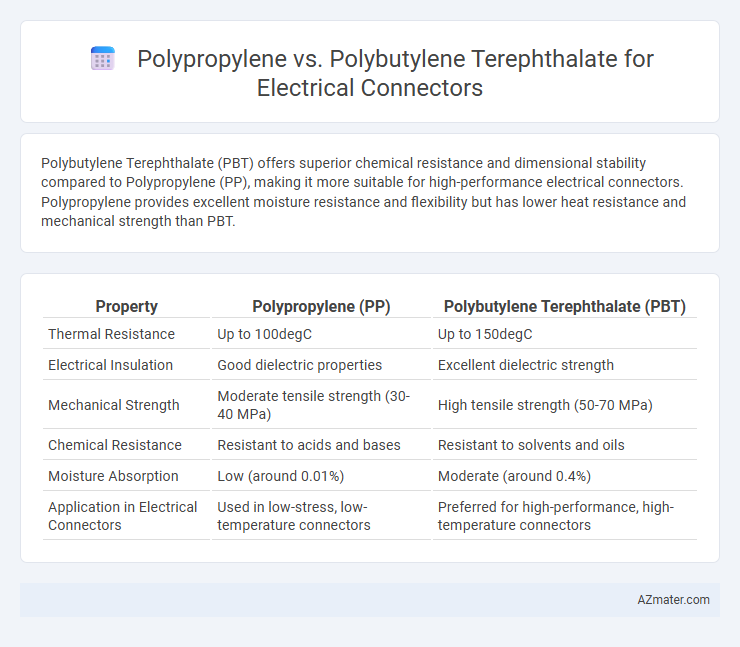Polybutylene Terephthalate (PBT) offers superior chemical resistance and dimensional stability compared to Polypropylene (PP), making it more suitable for high-performance electrical connectors. Polypropylene provides excellent moisture resistance and flexibility but has lower heat resistance and mechanical strength than PBT.
Table of Comparison
| Property | Polypropylene (PP) | Polybutylene Terephthalate (PBT) |
|---|---|---|
| Thermal Resistance | Up to 100degC | Up to 150degC |
| Electrical Insulation | Good dielectric properties | Excellent dielectric strength |
| Mechanical Strength | Moderate tensile strength (30-40 MPa) | High tensile strength (50-70 MPa) |
| Chemical Resistance | Resistant to acids and bases | Resistant to solvents and oils |
| Moisture Absorption | Low (around 0.01%) | Moderate (around 0.4%) |
| Application in Electrical Connectors | Used in low-stress, low-temperature connectors | Preferred for high-performance, high-temperature connectors |
Overview of Polypropylene and Polybutylene Terephthalate
Polypropylene (PP) is a thermoplastic polymer known for its excellent chemical resistance, low density, and good electrical insulation properties, making it suitable for electrical connector housings that require lightweight and cost-effective materials. Polybutylene Terephthalate (PBT) is a semi-crystalline engineering plastic characterized by high mechanical strength, heat resistance up to 150degC, and superior dimensional stability, which ensures reliable performance in electrical connectors exposed to higher thermal and mechanical stresses. Both materials offer distinct advantages: PP provides flexibility and chemical durability while PBT delivers enhanced thermal endurance and structural rigidity for demanding electrical connector applications.
Key Material Properties Comparison
Polypropylene (PP) offers excellent chemical resistance, low moisture absorption, and good electrical insulation, making it suitable for electrical connectors in non-extreme environments. Polybutylene terephthalate (PBT) provides superior mechanical strength, higher heat resistance up to 150degC, and enhanced dimensional stability, which are critical for connectors exposed to high temperatures and mechanical stress. PBT's enhanced dielectric properties and flame retardancy make it preferable for high-performance electrical connector applications requiring durability and safety compliance.
Mechanical Strength and Durability
Polypropylene offers moderate mechanical strength and excellent chemical resistance, making it suitable for lightweight electrical connectors exposed to moisture, but its durability under continuous mechanical stress is limited. Polybutylene Terephthalate (PBT) provides superior mechanical strength, high impact resistance, and excellent thermal stability, ensuring long-lasting durability in demanding electrical connector applications. The high tensile strength and dimensional stability of PBT make it ideal for connectors requiring resistance to heat, wear, and repeated mechanical load.
Thermal Stability and Heat Resistance
Polybutylene Terephthalate (PBT) offers superior thermal stability and heat resistance compared to Polypropylene (PP), making it more suitable for electrical connectors exposed to high temperatures. PBT can withstand continuous operating temperatures up to 150degC, while polypropylene typically degrades above 100degC. This enhanced thermal tolerance of PBT reduces the risk of deformation, maintaining electrical integrity and safety in demanding environments.
Electrical Insulation Performance
Polypropylene exhibits excellent electrical insulation properties with a dielectric constant typically around 2.2 to 2.4 and high volume resistivity, making it suitable for low-frequency electrical connector applications. Polybutylene Terephthalate (PBT) offers superior thermal stability along with a dielectric constant approximately 3.0 to 3.5, providing reliable insulation performance under higher temperature and harsh environmental conditions. The choice between polypropylene and PBT for electrical connectors depends on the required balance between insulation efficiency, thermal resistance, and mechanical strength in the specific application.
Chemical and Environmental Resistance
Polypropylene exhibits excellent chemical resistance to acids, bases, and solvents, making it suitable for electrical connectors exposed to harsh chemicals and moisture. Polybutylene Terephthalate (PBT) offers superior environmental resistance, including high thermal stability and resistance to UV radiation, oils, and hydrocarbons, ensuring durability in demanding outdoor applications. PBT's ability to withstand prolonged exposure to elevated temperatures and aggressive chemicals makes it preferable for connectors requiring long-term reliability in challenging environments.
Ease of Processing and Manufacturing
Polypropylene offers superior ease of processing for electrical connectors due to its lower melting point and excellent flow characteristics, enabling faster cycle times in injection molding. Polybutylene Terephthalate (PBT) provides higher mechanical strength and thermal stability but requires more precise temperature control and longer cooling times during manufacturing. Choosing polypropylene can reduce production costs and increase throughput, while PBT demands advanced processing techniques to achieve optimal part quality.
Cost-Effectiveness and Availability
Polypropylene offers superior cost-effectiveness for electrical connectors due to its low raw material cost and ease of processing, making it ideal for high-volume production runs. Polybutylene terephthalate (PBT) provides enhanced mechanical strength and thermal stability but comes with higher material and processing expenses, limiting its use to performance-critical applications. Availability of polypropylene is widespread globally, ensuring consistent supply chains, while PBT's more specialized manufacturing leads to moderate availability and potential lead times.
Common Electrical Connector Applications
Polypropylene offers excellent chemical resistance and low moisture absorption, making it suitable for automotive and consumer electronics connectors requiring durability in harsh environments. Polybutylene terephthalate (PBT) provides superior electrical insulation, thermal stability, and dimensional accuracy, commonly used in high-performance connectors for telecommunications and industrial equipment. Both materials support reliable signal transmission, but PBT is preferred where higher temperature resistance and mechanical strength are critical.
Choosing the Right Material for Electrical Connectors
Polypropylene offers excellent chemical resistance and low moisture absorption, making it suitable for electrical connectors in corrosive or humid environments. Polybutylene Terephthalate (PBT) provides superior thermal stability and higher mechanical strength, ideal for connectors exposed to elevated temperatures and mechanical stress. Selecting the right material depends on application-specific factors such as thermal requirements, environmental exposure, and electrical insulation performance.

Infographic: Polypropylene vs Polybutylene Terephthalate for Electrical Connector
 azmater.com
azmater.com